The Mission of the Archangel Michael
GA 194
VI. The Ancient Yoga Culture and the New Yoga Will. The Michael Culture of the Future
30 November 1919, Dornach
YOU HAVE seen from my lectures of the last few days that it is necessary, for a complete understanding of the human being, to distinguish the various members of the human organism and to realize the incisive difference between that which we may call the human head organization and that which constitutes the rest of the human organization. As you know, the rest of the human organization consists of two members, so that on the whole we obtain a three-fold membering, but for the comprehension of the significant impulses in mankind's evolution with which we are faced at the present time and in the immediate future the differentiation between head man and the organization of the rest of man is primarily important.
Now, if we speak spiritual-scientifically about the human being by differentiating between head man and the rest of man, then these two organizations are, at the outset, pictures for us, pictures created by nature herself for the soul element, for the spiritual element, whose expression and manifestation they are. Man is placed in the whole evolution of earth humanity in a way which becomes comprehensible only if one considers how different is the position of the head organization in this evolution from that of the rest of the human organization. Everything connected with the head organization, which chiefly manifests as man's life of thought, is something that reaches far back in the post-Atlantean evolution of mankind. When we focus our attention upon the time which followed immediately after the great Atlantean catastrophe, that is, the time of the sixth, seventh, eighth millennium before the Christian era, we shall find a soul mood holding sway in the regions of the civilized world of that period which can hardly be compared with our soul mood. The consciousness and whole conception of the world of the human being of that time can scarcely be compared with that which characterizes our sense perception and conceptual view of the world. In my Occult Science, an Outline {Anthroposophic Press, New York} I have called this culture which reaches back into such ancient times, the primeval Indian culture. We may say: the human head organism of that time was different from our present head organism to a great degree and the reckoning with space and time was not characteristic of this ancient people as it is of us. In surveying the world, they experienced a survey of immeasurable spatial distances, and they had a simultaneous experience of the various moments of time. The strong emphasis on space and time in world conception was not present in that ancient period.
The first indications of this we find toward the fifth and fourth millennium in the period we designate the primeval Persian period. But even then the whole mood of soul life is such that it can hardly be compared with the soul and world mood of the human being of our age. In that ancient time, the main concern of the human being is to interpret the things of the world as various shades of light, brilliancy, and darkness, obscurity. The abstractions in which we live today are completely foreign to that ancient earth population. There still exists a universal, all-embracing perception, a consciousness of the permeation of everything perceptible with light and its adumbration, shading, with various degrees of darkness. This was also the way the moral world order was conceived of. A human being who was benevolent and kind was experienced as a light, bright human being, one who was distrustful and selfish was experienced as a dark man. Man's moral individuality was, as it were, aurically perceived around him. And if we had talked to a man of this ancient, primeval Persian time about that which we call today the order of nature, he would not have understood a word of it. An order of nature in our sense did not exist in his world of light and shadow. For him, the world was a world of light and shadow; and in the world of tones, certain timbres of sounding he designated as light, bright, and certain other timbres of sounding he designated as dark, shadowy. And that which thus expressed itself through this element of light and darkness constituted for him the spiritual as well as the nature powers. For him, there existed no difference between spiritual and natural powers. Our present-day distinction between natural necessity and human freedom would have appeared to him as mere folly, for this duality of human arbitrary will and the necessity of nature did not exist for him. Everything was to be included for him in one spiritual—physical unity. If I were to give you a pictorial interpretation of the character of this primeval-Persian world conception, I would have to draw the following line. (It will receive its full meaning only through that which will follow.)
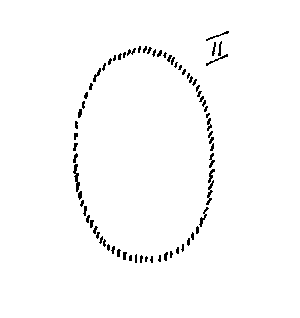
Then after this soul mood of man had held sway for somewhat more than two thousand years, there appeared a soul mood, the echoes of which we can still perceive in the Chaldean, in the Egyptian world conception, and in a special form in the world conception whose reflection is preserved for us in the Old Testament. There something appears which is closer to our own world conception. There the first inkling of a certain necessity of nature enters human thoughts. But this necessity of nature is still far removed from that which we call today the mechanical or even the vital order of nature; at that time, natural events are conceived of as identical with Divine willing, with Providence. Providence and nature events are still one. Man knew that if he moved his hand it was the Divine within him, permeating him, that moved his hand, that moved his arm. When a tree was shaken by the wind, the perception of the shaking tree was no different for him from the perception of the moving arm. He saw the same divine power, as Providence, in his own movements and in the movements of the tree. But a distinction was made between the God without and the God within; he was, however, conceived of as unitary, the God in nature, the God in man; he was the same. And it was clear to human beings of that time that there is something in man whereby Providence that is outside in nature and Providence that is inside in man meet one another.
At that time, man's process of breathing was sensed in this way. People said: If a tree is shaking, this is the God outside, and if I move my arm, it is the God inside; if I inhale the air, work it over within me, and again exhale it, then it is the God from outside who enters me and again leaves me. Thus the same divine element was sensed as being outside and inside, but simultaneously, in one point, outside and inside; people said to themselves: By being a breathing being, I am a being of nature outside and at the same time I am myself.
If I am to characterize the world conception of the third culture period by a line, as I have done for the primeval Persian world conception by the line of the preceding drawing, I shall have to characterize it through the following line:
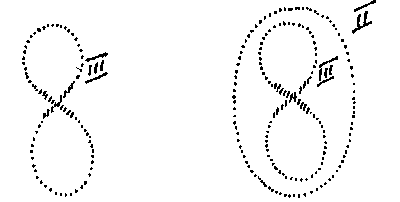
This line represents, on the one hand, the existence of nature outside, on the other hand, human existence, crossing over into the other at the one point, in the breathing process.
Matters become different in the fourth age, in the Graeco-Latin age. Here the human being is abruptly confronted by the contrast outside-inside, of nature existence and human existence. Man begins to feel the contrast between himself and nature. And if I am again to draw characteristically how man begins to feel in the Greek age, I will have to draw it this way: on the one hand he senses the external and on the other the internal; between the two there is no longer the crossing point.
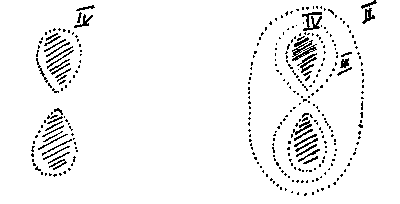
What man has in common with nature remains outside his consciousness. It falls away from consciousness. In Indian Yoga an attempt is made to bring it into consciousness again. Therefore Indian Yoga culture is an atavistic returning to previous evolutionary stages of mankind, because an attempt is made again to bring into consciousness the process of breathing, which in the third age was felt in a natural way as that in which one existed outside and inside simultaneously. The fourth age begins in the eighth pre-Christian century. At that time the late-Indian Yoga exercises were developed which tried to call back, atavistically, that which mankind had possessed at earlier times, quite particularly in the Indian culture, but which had been lost.
Thus, this consciousness of the breathing process was lost. And if one asks: Why did Indian Yoga culture try to call it back, what did it believe it would gain thereby? one has to answer: What was intended to be gained thereby was a real understanding of the outer world. For through the fact that the breathing process was understood in the third cultural age, something was understood within man that at the same time was something external.
This must again be attained; on another path, however. We live still under the after-effects of the culture in which a twofold element is present in the human soul mood, for the fourth period ends only around the year 1413, really only about the middle of the fifteenth century. We have, through our head organization, an incomplete nature conception, that which we call the external world; and we have through our inner organization, through the organization of the rest of man, an incomplete knowledge of ourselves.
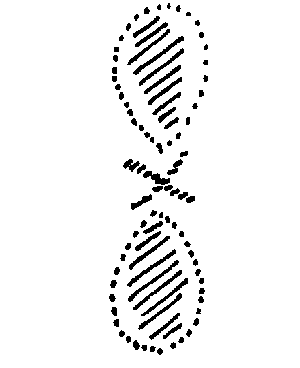
That in which we could perceive a process of the world and at the same time a process of ourselves is eliminated; it does not exist for us.
It is now a question of consciously regaining that which has been lost. That means, we have to acquire the ability of taking hold of something that is in our inner being, that belongs to the outer and the inner world simultaneously, and which reaches into both.
This must be the endeavor of the fifth post-Atlantean period; namely, the endeavor to find something in the human inner life in which an outer process takes place at the same time.
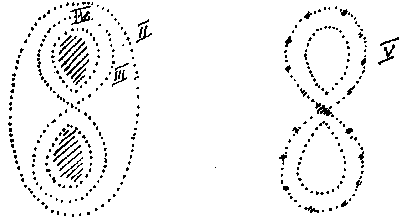
You will remember that I have pointed to this important fact; I have pointed to it in my last article in Soziale Zukunft (The Social Future) {Soziale Zukunft, Vol. III: Geistesleben, Rechtsordnung, Wirtschaft (Spiritual Life, Rights order, Economy), Vol. IV: Dreigliederung und soziales Vertrauen (The Threefold Social Order and Social Confidence) (not translated into English) where I seemingly dealt with these things in their importance for social life, but where I clearly pointed to the very necessity of finding something which the human being lays hold of within himself and which he, at the same time, recognizes as a process of the world. We as modern human beings cannot attain this by going back to Yoga culture; that has passed. For the breathing process itself has changed. This, of course, you cannot prove clinically; but the breathing process has become a different one since the third post-Atlantean cultural period. Roughly speaking, we might say: In the third post-Atlantean cultural epoch the human being breathed soul; today he breathes air. Not only our thoughts have become materialistic; reality itself has lost its soul.
I beg you, my dear friends, not to see something negligible in what I am now saying. For just consider what it means that reality itself, in which mankind lives, has been transformed so that the air we breathe is something different from what it was four millennia ago. Not only the consciousness of mankind has changed, oh no! there was soul in the atmosphere of the earth. The air was the soul. This is no longer the case today, or rather, it is soul in a different way. The spiritual beings of elemental nature of whom I have spoken yesterday, they penetrate into you, they can be breathed if one practices Yoga breathing today. But that which was attainable in normal breathing three millennia ago cannot be brought back artificially. That it may be brought back is the great illusion of the Orientals. What I am stating here describes a reality. The ensouling of the air which belongs to the human being no longer exists. And therefore the beings of whom I spoke yesterday—I should like to call them the anti-Michaelic beings—are able to penetrate into the air and, through the air, into the human being, and in this way they enter into mankind, as I have described it yesterday. We are only able to drive them away if we put in the place of Yoga that which is the right thing for today. We must strive for this. We can only strive for that which is the right thing for today if we become conscious of a much more subtle relation of man to the external world, so that in regard to our ether body something takes place which must enter our consciousness more and more, similar to the breathing process. In the breathing process, we inhale fresh oxygen and exhale unusable carbon. A similar process takes place in all our sense perceptions. Just think, my dear friends, that you see something—let us take a radical case—suppose you see a flame. There a process takes place that may be compared with inhalation, only it is much finer. If you then close your eyes—and you can make similar experiments with every one of your senses—you have the after-image of the flame which gradually changes—dies down, as Goethe said. Apart from the purely physical aspect, the human ether body is essentially engaged in this process of reception of the light impression and its eventual dying down. Something very significant is contained in this process: it contains the soul element which, three millennia ago, was breathed in and out with the air. And we must learn to realize the sense process, permeated by the soul element in a similar way we have realized the breathing process three millennia ago.
You see, my dear friends, this is connected with the fact that man, three millennia ago, lived in a night culture. Yahve revealed himself through his prophets out of the dreams of the night. But we must endeavor to receive in our intimate intercourse with the world not merely sense perceptions, but also the spiritual element. It must become a certainty for us that with every ray of light, with every tone, with every sensation of heat and its dying down we enter into a soul-intercourse with the world, and this soul-intercourse must become significant for us. We can help ourselves to bring this about.
I have described to you the occurrence of the Mystery of Golgotha in the fourth post-Atlantean period which, if we wish to be accurate, begins with the year 747 B.C. and ends with the year 1413 A.D. The Mystery of Golgotha occurred in the first third of this period, and it was comprehended at the outset, with the remnants of the ancient mode of thought and culture. This ancient way of comprehending the Mystery of Golgotha is exhausted and a new way of comprehension must take its place. The ancient way does no longer suffice, and many attempts that have been made to enable human thinking to grasp the Mystery of Golgotha have proved unsuitable to reach up to it.
You see, dear friends, all external-material things have their spiritual-soul aspect, and all things that appear in the spiritual-soul sphere have their external-material aspect. The fact that the air of the earth has become soul-void, making it impossible for man to breathe the originally ensouled air, had a significant spiritual effect in the evolution of mankind. For through being able to breathe in the soul to which he was originally related, as is stated at the beginning of the Old Testament: “And God breathed into man the breath as living soul,” man had the possibility of becoming conscious of the pre-existence of the soul, of the existence of the soul before it had descended into the physical body through birth or through conception. To the degree the breathing process ceased to be ensouled the human being lost the consciousness of the pre-existence of the soul. Even at the time of Aristotle in the fourth post-Atlantean period it was no longer possible to understand, with the human power of comprehension, the pre-existence of the soul. It was utterly impossible.
We are faced with the strange historical fact that the greatest event, the Christ Event, breaks in upon the evolution of the earth, yet mankind must first become mature in order to comprehend it. At the outset, it is still capable of catching the rays of the Mystery of Golgotha with the remnants of the power of comprehension originating in primeval culture. But this power of comprehension is gradually lost, and dogmatism moves further and further away from an understanding of the Mystery of Golgotha. The Church forbids the belief in the pre-existence of the soul—not because pre-existence is incompatible with the Mystery of Golgotha, but because the human power of comprehension ceased to experience the consciousness of pre-existence as a force, the air having become soul-void. Pre-existence vanishes from head-consciousness. When our sense processes will become ensouled again, we shall have established a crossing point, and in this crossing point we shall take hold of the human will that streams up, out of the third stratum of consciousness, as I have described it to you recently. Then we shall, at the same time, have the subjective-objective element for which Goethe was longing so very much. We shall have the possibility of grasping, in a sensitive way, the peculiar nature of the sense process of man in its relation to the outer world. Man's conceptions are very coarse and clumsy, indeed, which maintain that the outer world merely acts upon us and we, in turn, merely react upon it. In reality, there takes place a soul process from the outside toward the inside, which is taken hold of by the deeply subconscious, inner soul process, so that the two processes overlap. From outside, cosmic thoughts work into us, from inside, humanity's will works outward. Humanity's will and cosmic thought cross in this crossing point, just as the objective and the subjective element once crossed in the breath. We must learn to feel how our will works through our eyes and how the activity of the senses delicately mingles with the passivity, bringing about the crossing of cosmic thoughts and humanity's will. We must develop this new Yoga will. Then something will be imparted to us that of like nature to that which was imparted to human beings in the breathing process three millennia ago. Our comprehension must become much more soul-like, much more spiritual.
Goethe's world conception strove in this direction. Goethe endeavored to recognize the pure phenomenon, which he called the primal phenomenon, by arranging the phenomena which work upon man in the external world, without the interference of the Luciferic thought which stems from the head of man himself; this thought was only to serve in the arranging of the phenomena. Goethe did not strive for the law of nature, but for the primal phenomenon; this is what is significant with him. If, however, we arrive at this pure phenomenon, this primal phenomenon, we have something in the outer world which makes it possible for us to sense the unfolding of our will in the perception of the outer world, and then we shall lift ourselves to something objective-subjective, as it still was contained, for instance, in the ancient Hebrew doctrine. We must learn not merely to speak of the contrast between the material and the spiritual, but we must recognize the interplay of the material and the spiritual in a unity precisely in sense perception. If we no longer look at nature merely materially and, further, if we do not “think into it” a soul element, as Gustave Theodore Fechner did, then something will arise which will signify for us what the Yahve culture signified for mankind three millennia ago. If we learn, in nature, to receive the soul element together with sense perception, then we shall have the Christ relationship to outer nature. This Christ relationship to outer nature will be something like a kind of spiritual breathing process.
We shall be aided by realizing more and more, with our sound common sense, that pre-existence lies at the basis of our soul existence. We must supplement the purely egotistical conception of post-existence, which springs merely from our longing to exist after death, by the knowledge of the pre-existence of the soul. We must again rise to the conception of the real eternity of the soul. This is what may be called Michael culture. If we move through the world with the consciousness that with every look we direct outward, with every tone we hear, something spiritual, something of the nature of the soul element stream out into the world, we have gained the consciousness which mankind needs for the future.
I return once more to the image: You see a flame. You shut your eyes and have the after-image which ebbs away. Is that merely a subjective process? Yes, says the modern physiologist. But this is not true. In the cosmic ether this signifies an objective process, just as in the air the presence of carbonic acid which you exhale signifies an objective process. You are dealing here with the objective element; you have the possibility of knowing that something which takes place within you is at the same time a delicate cosmic process, if you become but conscious of it. If I look at a flame, close my eyes, let it ebb away—it will ebb away even though I keep my eyes open, only then I will not notice it—then I experience a process which does not merely take place within me, but which takes place in the world. But this is not only the case in regard to the flame, if I confront a human being and say: this man has said this or that, which may be true or untrue, this then constitutes a judgment, a moral or intellectual act of my inner nature. This ebbs away like a flame. It is an objective world process. If you think something good about your fellow-man: it ebbs away and is an objective process in the cosmic ether; if you think something evil: it ebbs away as an objective process. You are unable to conceal your perceptions and judgments about the world. You seemingly carry them on in your own being, but they are at the same time an objective world process. Just as people of the third period were conscious of the fact that the breathing process is a process that takes place simultaneously within man and in the objective world, so mankind must become aware in the future that the soul element of which I spoke is at the same time an objective world process.
This transformation of consciousness demands greater strength of soul than is ordinarily developed by the human being of today. To permeate oneself with this consciousness means to permit the Michael culture to enter. Just as it was self-evident for the man of the second and third pre-Christian millennium to think of the air as ensouled—so must it become self-evident for us to think of light as ensouled; we must arouse this ability in us when we consider light the general representative of sense perception We must thoroughly do away with the habit of seeing in light that which our materialistic age is accustomed to see in it. We must entirely cease to believe that merely those vibrations emanate from the sun of which, out of the modern consciousness, physics and people in general speak. We must become clear about the fact that the soul element penetrates through cosmic space upon the pinions of light; and we must realize, at the same time, that this was not the case in the period preceding our age. That which approaches mankind today through light approached mankind of that former period through the air. You see here an objective difference in the earth process. Expressing this in a comprehensive concept, we may say, Air-soul-process, Light-soul-process. This is what may be observed in the evolution of the earth. The Mystery of Golgotha signifies the transition from the one period to the other.

My dear friends, it does not suffice, for the present age nor for the future age of mankind, to speak in abstractions about the spiritual, to fall into some sort of nebulous pantheism; on the contrary, we must begin to recognize that that which today is sensed as a merely material process is permeated by soul.
It is a question of learning to say the following: there was a time prior to the Mystery of Golgotha when the earth had an atmosphere which contained the soul element that belongs to the soul of man. Today, the earth has an atmosphere which is devoid of this soul element. The same soul element that was previously in the air has now entered the light which embraces us from morning to evening. This was made possible through the fact that the Christ has united Himself with the earth. Thus, also from the soul-spiritual aspect, air and light underwent a change in the course of the Earth evolution.
My dear friends, it is a childish presentation that describes air and light in the same manner, purely materially, throughout the millennia in which Earth evolution unfolded. Air and light have changed inwardly. We live in an atmosphere and in a light sphere that are different from those in which our souls lived in previous earthly incarnations. To learn to recognize the externally-material as a soul-spirited element: this is what matters. If we describe purely material existence in the customary manner and then add, as a kind of decoration: this material existence contains everywhere the spiritual! This will not produce genuine spiritual science. My dear friends, people are very strange in this respect; they are intent on withdrawing to the abstract. But what is necessary is the following: in the future we must cease to differentiate abstractly between the material and the spiritual, but we must look for the spiritual in the material itself and describe it as such; and we must recognize in the spiritual the transition into the material and its mode of action in the material. Only if we have attained this shall we be able to gain a true knowledge of man himself. “Blood is quite a special fluid,” but the fluid physiology speaks about today is not a “special fluid,” it is merely a fluid whose chemical composition one attempts to analyze in the same way any other substance is analyzed; it is nothing special. But if we have gained the starting point of being able to understand the metamorphosis of air and light from the soul aspect, we shall gradually advance to the soul-spiritual comprehension of the human being himself, in every respect; then we shall not have abstract matter and abstract spirit, but spirit, soul, and body working into one another. This will be Michael-culture.
This is what our time demands. This is what ought to be grasped with all the fibers of the soul life by those human beings who wish to understand the present time. Whenever something out of the ordinary had to be introduced into human world conception it met with resistance. I have often quoted the following neat example: In 1837 (not even a century ago), the learned Medical College of Bavaria was asked, when the construction of the first railroad from Fuerth to Nuremberg was proposed, whether it was hygienically safe to build such a railroad. The Medical College answered (I am not telling a fairy tale, the documents concerning it exist): Such a railroad should not be built, for people who would use such a means of transportation would become nervously ill. And they added: Should there be such people who insist on such railroads, then, it is absolutely necessary to erect, on the right and left side of the tracks, high plank walls to prevent the people whom the train passes from getting concussion of the brain. Here you see, my dear friends, such a judgment is one thing; quite another is the course which the evolution of mankind takes. Today we smile about such a document as that of the Bavarian Medical College of 1837; but we are not altogether justified in smiling; for, if something similar occurs today, we behave in quite the same manner. And, after all, the Bavarian Medical College was not entirely wrong. It we compare the state of nerves of modern mankind with that of mankind two centuries ago, then we must say that people have become nervous. Perhaps the Medical College has exaggerated the matter a bit, but people did become nervous. Now, in regard to the evolution of mankind it is imperative that certain impulses which try to enter Earth evolution really should enter and not be rejected. That which from time to time wishes to enter human cultural development is often very inconvenient for people, it does not agree with their indolence, and what is duty in regard to human cultural development must be recognized by learning to read the objective facts, and must not be derived from human indolence, not even from a refined kind of indolence. I am concluding today's lecture with these words because there is no doubt that a strongly increasing battle will take place between anthroposophical cognition and the various creeds. We can see the signs for this on all sides. The creeds who wish to remain in the old beaten tracks, who do not wish to arouse themselves to a new knowledge of the Mystery of Golgotha, will reinforce their strong fighting position which they already have taken up, and it would be very frivolous, my dear friends, if we would remain unconscious of the fact that this battle has started.
I myself, you can be sure, am not at all eager for such a battle, particularly not for a battle with the Roman Catholic Church which, it seems, is forced upon us from the other side with such violence. He who, after all, thoroughly knows the deeper historical impulses of the creeds of our time will be very unwilling to fight time-honored institutions. But if the battle is forced upon us, it is not to be avoided! And the clergy of our day is not in the least inclined to open its doors to that which has to enter: the spiritual-scientific world conception. Remember the grotesque quotations I read to you recently where it was said that people should inform themselves about anthroposophically-oriented spiritual science through the writings of my opponents, since Roman-Catholics are forbidden by the Pope to read my own writings. This is not a light matter, my dear friends; it is a very serious matter! A battle which arises in such a manner, which is capable of disseminating such a judgment in the world, such a battle is not to be taken lightly. And what is more; it is not to be taken lightly since we do not enter it willingly. Let us take the example of the Roman-Catholic Church, my dear friends; matters are not different in regard to the Protestant Church, but the Roman-Catholic church is more powerful—and we have to consider time-honored institutions: if one understands the significance of the vestments of the priest when he reads the Holy Mass, the meaning of every single piece of his priestly garments, if one understands every single act of the Holy Mass, then one knows that they are sacred, time-honored establishments; they are establishments more ancient than Christianity for the Holy Mass is a ritual of the ancient Mystery culture, transformed in the Christian sense. And modern clergy who uses such weapons as described above lives in these rituals! Thus, if one has, on the one hand, the deepest veneration for the existing rituals and symbolism, and sees, on the other hand, how insufficient is the defense of and how serious are the attacks against that which wishes to enter mankind's evolution, then one becomes aware of the earnestness that is necessary in taking a stand in these matters. It is truly something worth deep study and consideration. What is thus heralded from that side is only at its beginnings; and it is not right to sleep in regard to it; on the contrary, we have to sharpen our perception for it. During the two decades in which the Anthroposophical Movement has been fostered in Middle Europe, we could indulge in sectarian somnolence which was so hard to combat in our own ranks and which still today sits so deeply embedded in the souls of the human beings who have entered the Anthroposophical Movement. But the time has passed in which we might have been allowed to indulge in sectarian somnolence. That which I have often emphasized here is deeply true, namely, that it is necessary that we should grasp the world-historical significance of the Anthroposophical Movement and overlook trifles, but that we should also consider the small impulses as serious and great.

